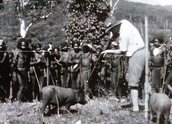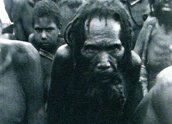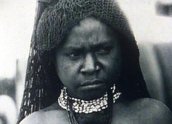


First Contact (1983)
Synopsis
First Contact is an astonishing documentary about the three Australian Leahy brothers (Michael, Dan and James) who went gold prospecting in what they thought was a completely uninhabited part of the remote Western Highlands of New Guinea. They encountered thousands of highlanders who were seeing ‘white’ men for the very first time. The documentary uses both the footage shot by Michael Leahy in the early 1930s and interviews shot 50 years later with the two surviving Leahy brothers and some of the highlanders who witnessed their coming.
Curator’s notes
Although Robin Anderson and Bob Connolly had made several films together, First Contact was their first major independent documentary. The idea of the film was sparked by a conversation they had with ABC Radio’s Tim Bowden who was working on an oral history project about Australia’s involvement in Papua New Guinea. The filmmakers were intrigued by the Leahy brothers‘ expeditions into uncharted areas in the highlands of New Guinea searching for gold. Robin Anderson set about researching and struck ‘gold’ herself when Michael Leahy’s son, Richard, gave her seven rusty cans of old 16mm film – two hours of footage that documented the ‘first contact’. This material became the basis of First Contact.
Much to the Leahy brothers’ surprise, a million New Guinea tribespeople lived in the remote and mountainous highland area that they had ventured into. The highlanders had no knowledge of the outside world. The Leahys wore clothes, came in airplanes and brought with them shells, steel axes, tools of trade, tin cans, rifles, a 16mm camera and a gramophone. The film explores the memories of the Leahys and the highlanders, and their behaviour and reactions to each other.
First Contact is a complex documentary about cultural contact and confrontation. The documentary at times is surprising, shocking and humorous but overall it is compelling. It is full of paradoxes and contradictions and leaves the viewer to ponder issues of exploitation, greed, desire, racial superiority, colonialism, cultural differences and similarities.
Creating First Contact set the filmmakers on a 10-year journey making a trilogy of films ‘investigating the historical, social and economic factors facing the first peoples of Papua New Guinea and the conflicting values of tribalism and capitalism’. The other two films in the trilogy are Joe Leahy’s Neighbours (1989) and Black Harvest (1992).
First Contact won 10 international awards, including the Australian Film Institute Award for Best Documentary in 1983, the Grand Prix at the prestigious Festival Cinéma du Réel in Paris in 1983 and was nominated for an Academy Award in 1984.
Anderson and Connolly co-wrote a book about their experiences, also called First Contact (1987, Viking Penguin).
First Contact screened in many film festivals around the world before it was broadcast in Australia on Channel 7 in 1983 and then in the US, Canada and countries across Europe.
- Overview
- Curator’s notes
- Video 3 clips

- Principal credits
- Find a copy
- Make a comment
- Add your review



